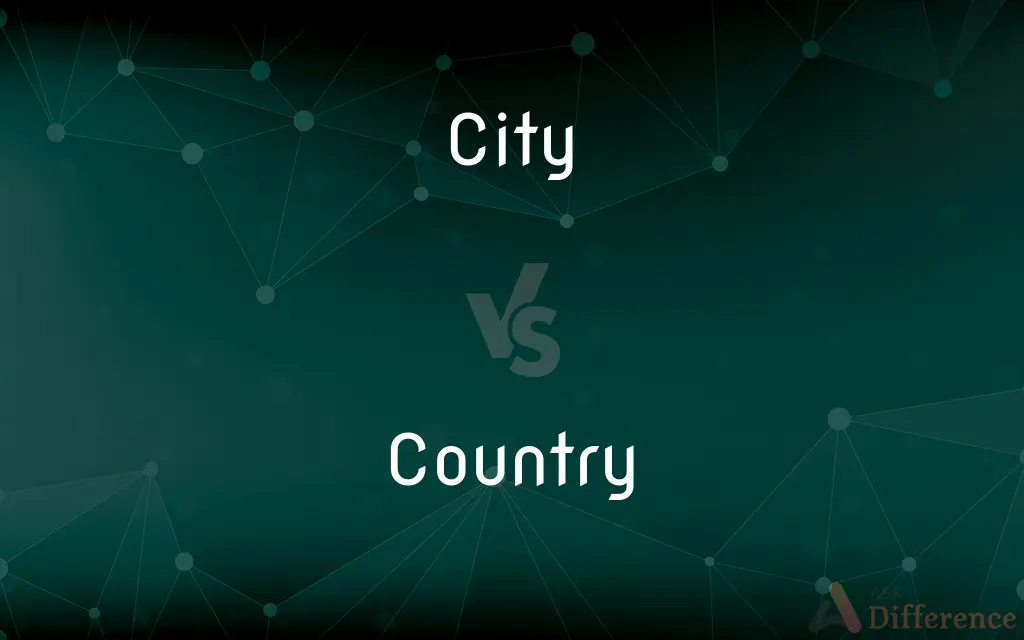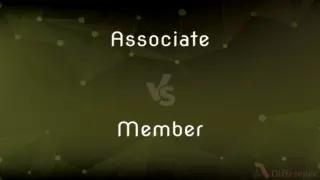City vs. Country — What's the Difference?
By Tayyaba Rehman — Updated on September 21, 2023
A city is a large urban settlement, while a country is a distinct territorial body or political entity recognized as independent.

Difference Between City and Country
Table of Contents
ADVERTISEMENT
Key Differences
A city is characterized by its dense population, infrastructure, and a concentration of both cultural and administrative functions. A country, on the other hand, encompasses vast expanses of land, includes various cities and towns, and operates as a sovereign entity on the global stage.
Cities often form the economic backbone of a country, with commercial hubs, industries, and other economic activities clustered within them. In contrast, a country represents the collective economic, political, and cultural identity of its people, spanning both urban and rural regions.
A city typically has a governing body responsible for local administrative functions, such as a mayor or city council. Countries have a broader governing structure, which includes the national government and its different branches responsible for statewide policies and decisions.
While cities are often bustling hubs of activity with high-rise buildings, advanced public transport systems, and numerous amenities, countries offer a diverse landscape that includes cities, towns, villages, forests, mountains, and more.
The culture within a city can be vastly different from that in another city within the same country. Countries, however, have a national identity and shared cultural values, although regional differences and traditions do exist.
ADVERTISEMENT
Comparison Chart
Definition
A large urban settlement
A territorial body recognized as an independent state
Governing Body
Mayor, City Council
National government
Examples
New York, Los Angeles
United States, Canada
Representative Symbol
Skyscrapers, Subway systems
National flag, anthem
Landscape Variety
Limited (mostly urban)
Diverse (urban, rural, mountains, forests)
Compare with Definitions
City
An administrative district with its own local government.
The city council announced new regulations for businesses.
Country
A distinct territorial body or political entity.
Canada is the second-largest country by land area.
City
A hub for cultural, economic, and social activities.
The city has a vibrant nightlife and numerous museums.
Country
A nation with its own government.
The country has a democratic system of governance.
City
A commercial and business center.
The city's downtown area is filled with corporate offices and shopping centers.
Country
Land that is not in towns, cities, or industrial areas.
They moved to the country to embrace a quieter lifestyle.
City
A densely populated urban area.
New York is a bustling city known for its iconic landmarks.
Country
A country is a distinct territorial body or political entity (i.e. a nation).
City
A place with advanced infrastructure and amenities.
The city offers advanced healthcare facilities and educational institutions.
Country
A nation with its own government, occupying a particular territory
The country's increasingly precarious economic position
Spain, Italy, and other European countries
City
A city is a large human settlement. It can be defined as a permanent and densely settled place with administratively defined boundaries whose members work primarily on non-agricultural tasks.
Country
Districts and small settlements outside large urban areas or the capital
A country lane
The airfield is right out in the country
City
A large town
One of Italy's most beautiful cities
The city council
Country
An area or region with regard to its physical features
A tract of wild country
City
Short for City of London
Country
Short for country music
City
A center of population, commerce, and culture; a town of significant size and importance.
Country
A nation or state.
City
An incorporated municipality in the United States with definite boundaries and legal powers set forth in a charter granted by the state.
Country
The territory of a nation or state; land.
City
A Canadian municipality of high rank, usually determined by population but varying by province.
Country
The people of a nation or state; populace
The whole country will profit from the new economic reforms.
City
A large incorporated town in Great Britain, usually the seat of a bishop, with its title conferred by the Crown.
Country
The land of a person's birth or citizenship
Foreign travel is restricted in his country.
City
The inhabitants of a city considered as a group.
Country
A region, territory, or large tract of land distinguishable by features of topography, biology, or culture
Hill country.
Bible country.
City
An ancient Greek city-state.
Country
An area or expanse outside cities and towns; a rural area
A vacation in the country.
City
(Slang) Used in combination as an intensive
The playing field was mud city after the big rain.
Country
The people of a district who are eligible for jury service.
City
City The financial and commercial center of London. Used with the.
Country
A jury.
City
A large settlement, bigger than a town; sometimes with a specific legal definition, depending on the place.
São Paulo is the largest city in South America.
Country
(Informal) Country music.
City
(UK) A settlement granted special status by royal charter or letters patent; traditionally, a settlement with a cathedral regardless of size.
Country
Of, relating to, or typical of the country
A country road.
Country cooking.
City
(Australia) The central business district; downtown.
I'm going into the city today to do some shopping.
Country
Of or relating to country music.
City
(slang) A large amount of something used after the noun.
It’s video game city in here!
Country
(chiefly British) An area of land; a district, region.
City
A large town.
Country
A set region of land having particular human occupation or agreed limits, especially inhabited by members of the same race, speakers of the same language etc., or associated with a given person, occupation, species etc.
City
A corporate town; in the United States, a town or collective body of inhabitants, incorporated and governed by a mayor and aldermen or a city council consisting of a board of aldermen and a common council; in Great Britain, a town corporate, which is or has been the seat of a bishop, or the capital of his see.
A city is a town incorporated; which is, or has been, the see of a bishop; and though the bishopric has been dissolved, as at Westminster, it yet remaineth a city.
When Gorges constituted York a city, he of course meant it to be the seat of a bishop, for the word city has no other meaning in English law.
Country
The territory of a nation, especially an independent nation state or formerly independent nation; a political entity asserting ultimate authority over a geographical area; a sovereign state.
City
The collective body of citizens, or inhabitants of a city.
Country
A rural area, as opposed to a town or city; the countryside.
City
Of or pertaining to a city.
Country
Ellipsis of country music
A country song
A country singer
A country festival
City
A large and densely populated urban area; may include several independent administrative districts;
Ancient Troy was a great city
Country
(mining) The rock through which a vein runs.
City
An incorporated administrative district established by state charter;
The city raised the tax rate
Country
From or in the countryside or connected with it.
City
People living in a large densely populated municipality;
The city voted for Republicans in 1994
Country
Of or connected to country music.
Country
Originating in India rather than being imported from Europe or elsewhere.
Country
A tract of land; a region; the territory of an independent nation; (as distinguished from any other region, and with a personal pronoun) the region of one's birth, permanent residence, or citizenship.
Return unto thy country, and to thy kindred.
I might have learned this by my last exile,that change of countries cannot change my state.
Many a famous realmAnd country, whereof here needs no account
Country
Rural regions, as opposed to a city or town.
As they walked, on their way into the country.
God made the covatry, and man made the town.
Only very great men were in the habit of dividing the year between town and country.
Country
The inhabitants or people of a state or a region; the populace; the public. Hence: (a) One's constituents. (b) The whole body of the electors of state; as, to dissolve Parliament and appeal to the country.
All the country in a general voiceCried hate upon him.
Country
A jury, as representing the citizens of a country.
Country
The rock through which a vein runs.
Country
Pertaining to the regions remote from a city; rural; rustic; as, a country life; a country town; the country party, as opposed to city.
Country
Destitute of refinement; rude; unpolished; rustic; not urbane; as, country manners.
Country
Pertaining, or peculiar, to one's own country.
She, bowing herself towards him, laughing the cruel tyrant to scorn, spake in her country language.
Country
The territory occupied by a nation;
He returned to the land of his birth
He visited several European countries
Country
A politically organized body of people under a single government;
The state has elected a new president
African nations
Students who had come to the nation's capitol
The country's largest manufacturer
An industrialized land
Country
The people who live in a nation or country;
A statement that sums up the nation's mood
The news was announced to the nation
The whole country worshipped him
Country
An area outside of cities and towns;
His poetry celebrated the slower pace of life in the country
Country
A particular geographical region of indefinite boundary (usually serving some special purpose or distinguished by its people or culture or geography);
It was a mountainous area
Bible country
Country
A region identified by its geography, history, and culture.
The country's rich heritage is evident in its monuments and traditions.
Country
A particular state or nation's territory.
The wine regions of the country are popular tourist attractions.
Common Curiosities
What defines a city's boundaries?
A city's boundaries are usually determined by local administrative decisions and can be based on population or geographic markers.
Can a city be larger than a country in terms of population?
Yes, some cities, like Tokyo, have a population greater than that of smaller countries.
Is the culture the same across an entire country?
No, countries often have diverse cultures across different regions, but there may be shared national values or symbols.
How does living in a city differ from living in the country?
City living is often characterized by a faster pace, more amenities, and greater connectivity, while country living offers more space, nature, and tranquility.
How is a country's border established?
A country's borders are often established through historical treaties, wars, negotiations, or colonization.
Do cities have their own flags?
Some cities do have their own flags, emblematic of their local identity, though it's more common for countries to have national flags.
How does urbanization impact a city?
Urbanization can lead to increased economic activity in a city but might also result in challenges like congestion and pollution.
What's the capital city's role in a country?
The capital city usually houses the primary governmental institutions and often plays a central role in political, cultural, and economic activities.
Can a city exist independently without being part of a country?
Typically, no. Cities are part of larger administrative structures, such as states or countries.
Are all countries recognized by every other country?
No, recognition of countries can be political, and not all nations globally recognize every country.
Share Your Discovery

Previous Comparison
Associate vs. Member
Next Comparison
Ethane vs. EtheneAuthor Spotlight
Written by
Tayyaba RehmanTayyaba Rehman is a distinguished writer, currently serving as a primary contributor to askdifference.com. As a researcher in semantics and etymology, Tayyaba's passion for the complexity of languages and their distinctions has found a perfect home on the platform. Tayyaba delves into the intricacies of language, distinguishing between commonly confused words and phrases, thereby providing clarity for readers worldwide.
















































